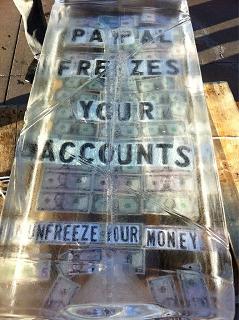WePay, an upstart rival of PayPal, had a little pointed fun with the financial transaction behemoth today outside the Innovate 2010 software developer conference that PayPal hosted at Moscone Center. WePay employees created a large block of ice frozen around cash and the message “PayPal Freezes Your Accounts.”
It was a reference to the PayPal practice of unexpectedly freezing the accounts of grassroots groups with pending nonprofit status, a story that went viral in August after the Bay Guardian wrote about PayPal freezing the funds of the Flux Foundation just as the group was headed to Burning Man to build the Temple of Flux.
In the face of a strong public backlash, PayPal released the Flux Foundation’s funds a day after our story came out. But as we reported, other small groups that don’t have the same community ties and emotional resonance as the temple crew have had a hard time freeing their funds. Some even say they are preparing to sue PayPal, which started as a small Bay Area company but grew into a huge multinational corporation after being purchased in 2002 by eBay, the company where billionaire self-funded gubernatorial candidate Meg Whitman made her fortune.
After their bad experience with PayPal, the Flux Foundation and many other groups have turned to WePay, which focuses on grassroots groups and other small clients. WePay co-founder Rich Aberman told the Guardian that many software developers who use PayPal to fundraise have had similar problems with funds being frozen as the grassroots groups, which is why he pursued this publicity stunt.
“It was just to raise awareness and poke a little fun at them at their own conference,” Aberman told us.
A PayPal representative that we interviewed in August said he couldn’t discuss why the company freezes account or how much notice they give when they do so, citing privacy concerns, but said they were simply anti-fraud measures. Some PayPal critics note that the company makes money off investing those forzen funds and they say it is motivated by greed.
Aberman doesn’t think the PayPal has malicious motives, but he says that it has just gotten too big to effectively serve small clients, focusing instead on merchants and other larger customers that are more sophisticated than small groups.
“Normal people collecting money for normal things is such a small part of their business and PayPal just don’t know how to handle them. They just see these as high-risk accounts based on the anti-fraud systems they’ve created,” Aberman said. Where he does fault PayPal is by presenting itself as a good service for these groups: “They just need to be more forthright about the user they’re trying to serve.”
By contrast, Aberman said WePay was created as a way for individuals and small groups to raise money informally: “Since our customers are different, we handle them differently.”

